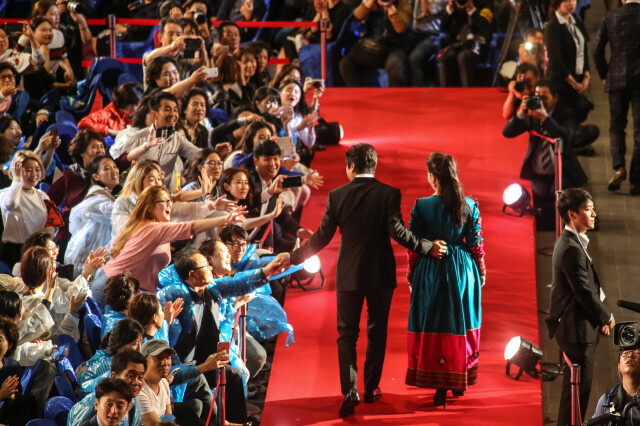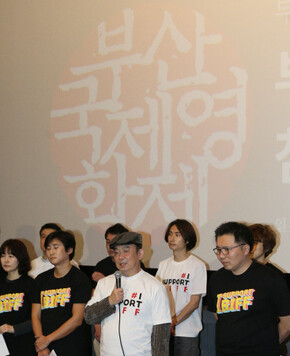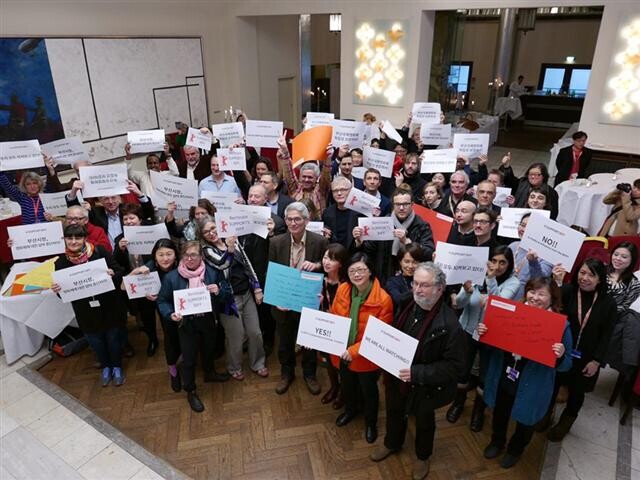hankyoreh
Links to other country sites 다른 나라 사이트 링크
Busan Film Fest facing possibility of an empty red carpet

With less than six months before it is supposed to kick off, this year’s Busan International Film Festival (BIFF) is at a critical junction. While South Korean filmmakers have threatened a mass boycott if the festival’s independence is not guaranteed, the city of Busan is still trying to maintain its grip on the festival as it works to revise the festival’s charter. This is sparking concerns that this year’s festival will be a shadow of its former self.

According to interviews with Busan city officials and film festival representatives on Apr. 19, the city of Busan wants to revise the festival’s charter to enable the Busan mayor to appoint the chair of the festival’s organizing committee. While the city claims that the mayor would choose the appointee from among multiple nominees recommended by the film festival’s executive committee, festival representatives still harbor suspicions that the city intends to maintain control over the festival.
Such suspicions are the result of a dispute that began during the 19th festival in 2014 over the screening of “The Truth Shall Not Sink with Sewol” (also called “Diving Bell”) a film that dealt with the Sewol tragedy. This dispute culminated in the city of Busan dismissing Lee Yong-gwan, the festival’s executive chair, and filing a complaint with the public prosecutors.
Festival representatives are calling for the organization committee chair to be appointed at an assembly attended by a large number of filmmakers in order to ensure the festival’s independence and to prevent the Busan government from dominating it.
Some people are even describing the Busan government’s attempts to revise the festival’s charter as a cunning ploy by the city’s mayor, Suh Byung-soo.
In February, Suh convened a press conference at which he promised to step down as the film festival’s organizing committee chair and give the position to the private sector. But he has yet to actually step down, explaining that he must first complete the work on revising the charter.
With Busan government and the film festival‘s executive committee facing an impasse in negotiations about revising the charter, a group of filmmakers have voted for a mass boycott of the film festival.
On Apr. 18, the Film Industry Emergency Committee for Protecting the Busan International Film Festival released a statement announcing their decision to hold a “complete boycott” of the film festival. This would include not submitting films to the competitions and not attending events.
The filmmakers who are part of the emergency committee appear to be motivated by a sense of desperation that they must seize this opportunity to ensure the independence of the film festival.
During the first week of April, each of the nine groups that are part of the emergency committee (including the Korean Film Producers Association and the Directors Guild of Korea) held a vote on the boycott. The majority of members in these groups participated in the vote, and more than 90% in favor of a “complete boycott.”
“The film industry has not come together with such unity for 10 years, since our opposition to reducing the screen quota in 2006,” the emergency committee said in its statement. “If Busan Mayor Suh Byung-soo does not step down as organizing committee chair and no steps are taken to guarantee the independence of the Busan Film Festival, we will have no choice but to boycott the festival.”
“If measures are taken to ensure the independence of the Busan Film Festival, we will call another vote, but under the present circumstances, our only choice is a boycott,” Lee Eun, president of the Korean Film Producers Association, told the Hankyoreh on Apr. 19.
There are only six months left before this year’s film festival is scheduled to start on Oct. 6. It is very likely that prominent figures in the overseas film industry will also decline to attend the festival in sympathy with the boycott by South Korean filmmakers.

During international film festivals in Berlin and Rotterdam at the beginning of the year, filmmakers around the world held events titled “I Support BIFF” at which they criticized the city of Busan‘s political interference and called for guaranteeing the film festival’s independence.
Indeed, last month the film festival started accepting entries in its domestic and international film competitions, which will determine the films that will be featured this year, but the number of films being submitted is considerably fewer than last year.
“With the situation at the festival dragging on, the number of entries is decreasing,” said Kim Ji-seok, the festival‘s senior programmer. “This year, we will have no choice but to feature fewer films. The only question is how few there will be.”
Under such circumstances, some members of the film community are concerned that this will dent BIFF’s reputation as Asia‘s top international film festival, a reputation it has been building for nearly two decades.
They are especially worried about the fact that the Beijing International Film Festival, which launched in 2011, has been spending big in order to surpass BIFF.
The conflict between the city of Busan and the film festival began when the city took issue with the screening of “The Truth Shall Not Sink with Sewol” in 2014. When the festival went ahead with the screening over the city’s objections, the city audited the festival, sacked Lee Yong-kwan, who was chair of the executive committee, and reported him to the prosecutors.
During the regular general session in February of this year, the executive committee, including 68 newly appointed advisers, called for an extraordinary general session to be held to revise the festival’s charter. But Busan asked the Busan District Court for an injunction to nullify the appointment of the new advisers, and on Apr. 11, the court consented.
Having exhausted its last recourse for preserving the festival’s autonomy, the emergency committee resolved to boycott the festival.
“We regret the emergency committee’s decision to boycott the film festival,” a spokesperson for the city of Busan said on Apr. 19. “The city is currently continuing to deliberate with the executive committee about a reasonable revision of the festival’s charter, which would include allowing the private sector to select the organizing committee chair.”
By Kim Kwang-soo, Busan correspondent
Please direct questions or comments to [english@hani.co.kr]

Editorial・opinion
![[Editorial] Does Yoon think the Korean public is wrong? [Editorial] Does Yoon think the Korean public is wrong?](https://flexible.img.hani.co.kr/flexible/normal/500/300/imgdb/original/2024/0417/8517133419684774.jpg) [Editorial] Does Yoon think the Korean public is wrong?
[Editorial] Does Yoon think the Korean public is wrong?![[Editorial] As it bolsters its alliance with US, Japan must be accountable for past [Editorial] As it bolsters its alliance with US, Japan must be accountable for past](https://flexible.img.hani.co.kr/flexible/normal/500/300/imgdb/original/2024/0417/6817133413968321.jpg) [Editorial] As it bolsters its alliance with US, Japan must be accountable for past
[Editorial] As it bolsters its alliance with US, Japan must be accountable for past- [Guest essay] Amending the Constitution is Yoon’s key to leaving office in public’s good graces
- [Editorial] 10 years on, lessons of Sewol tragedy must never be forgotten
- [Column] A death blow to Korea’s prosecutor politics
- [Correspondent’s column] The US and the end of Japanese pacifism
- [Guest essay] How Korea turned its trainee doctors into monsters
- [Guest essay] As someone who helped forge Seoul-Moscow ties, their status today troubles me
- [Editorial] Koreans sent a loud and clear message to Yoon
- [Column] In Korea’s midterm elections, it’s time for accountability
Most viewed articles
- 1[Column] The clock is ticking for Korea’s first lady
- 2Samsung barricades office as unionized workers strike for better conditions
- 3[Editorial] When the choice is kids or career, Korea will never overcome birth rate woes
- 4[News analysis] After elections, prosecutorial reform will likely make legislative agenda
- 5S. Korea, Japan reaffirm commitment to strengthening trilateral ties with US
- 6Japan officially says compensation of Korean forced laborers isn’t its responsibility
- 7Why Israel isn’t hitting Iran with immediate retaliation
- 8[Editorial] Does Yoon think the Korean public is wrong?
- 9[Guest essay] How Korea turned its trainee doctors into monsters
- 10[Editorial] As it bolsters its alliance with US, Japan must be accountable for past